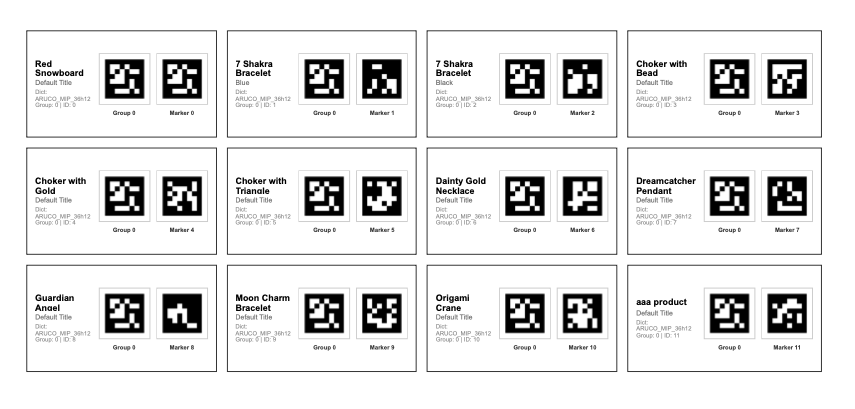Tangible Commerce
A Shopify app for linking products to markers with a path to RFID and NFC

Tech Stack
Frontend
Backend
Infrastructure
Tangible Commerce
A Shopify app that creates and manages links between products and physical markers.
Overview
The app is embedded within the Shopify admin dashboard using App Bridge and OAuth 2.0 authentication. It assigns ArUco markers to products and variants, generates printable sheets, and keeps a registry so markers are not reused. This reduces manual labeling errors and adds a path toward RFID or NFC integration.
Why I Built It
Physical inventory projects often need a clean handshake between the digital catalog and real-world items. This app formalizes that mapping and prepares for richer interactions beyond simple labels.
What I Built
- Marker assignment flows for products and variants
- A registry to track status and avoid duplication
- Printable sheets for batch application
- Hooks to extend to RFID and NFC later
Tech Behind the Scenes
Frontend
React with Polaris for a native Shopify feel.
Backend
Go based API with persistent storage and clean endpoints for batch operations.
Deployment
Shopify App embedded within the admin dashboard using App Bridge for iframe integration. The app implements OAuth 2.0 authentication with session token validation for secure access to Shopify’s admin APIs. Hosted backend with persistent storage and room for WebSocket updates.
What I Learned
- How to develop a Shopify app using Polaris that seamlessly fits into a merchant’s Shopify admin with secure authentication.
- How to generate ArUco markers and PDFs.
- How to store data on objects in Shopify as well as in a PostgreSQL database using Prisma.
- Batch operations are essential for user experience and scalability.
- How to design a flexible data model that supports future mediums like RFID and NFC.
Takeaway
A practical bridge between Shopify products and physical markers with a forward path to richer hardware tags.
Gallery

